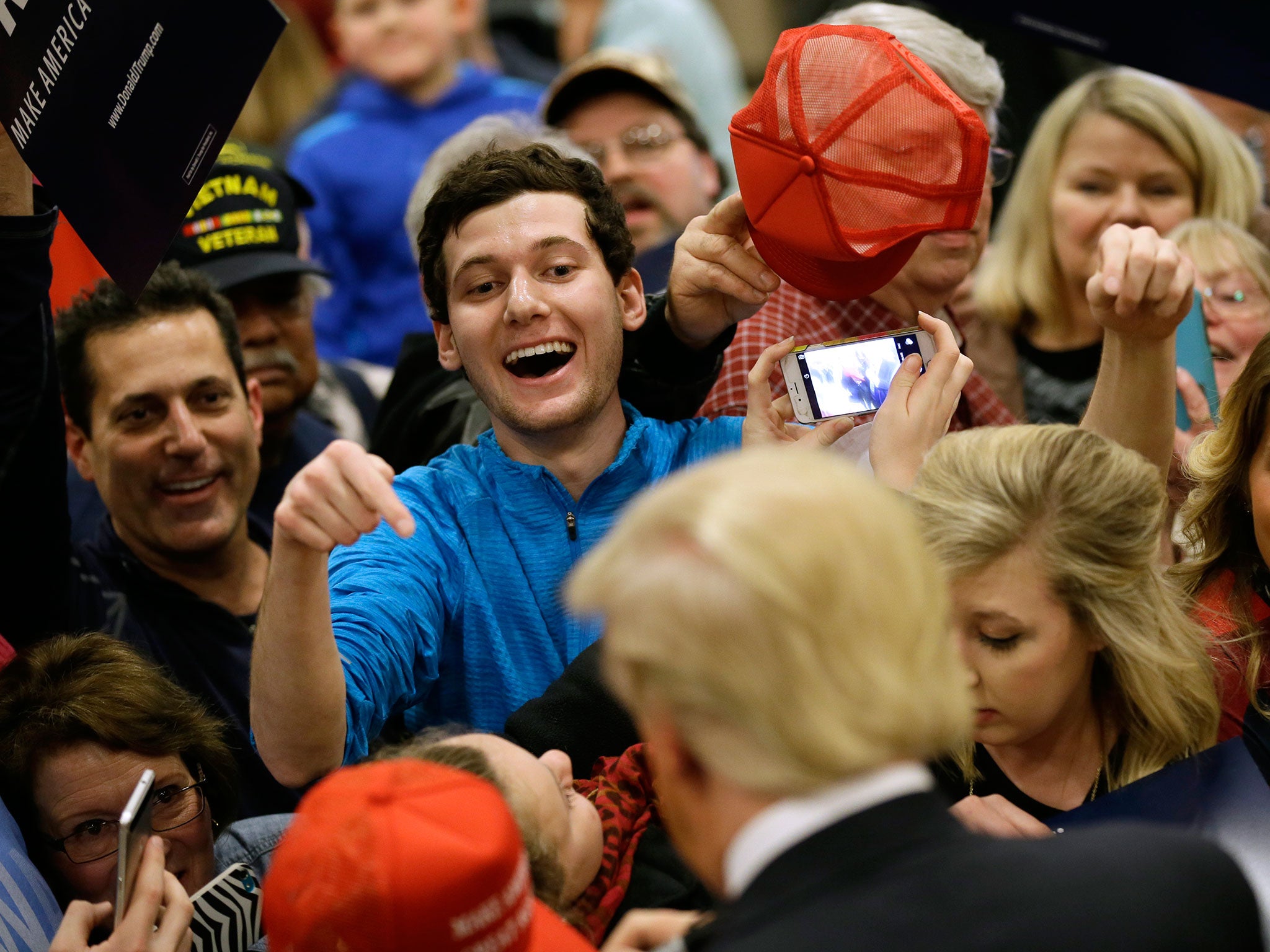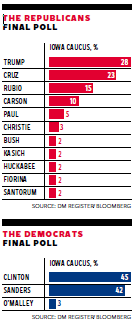Iowa caucus: Seven things we know ahead of the first big test for Donald Trump, Hillary Clinton and Co
With candidates vying neck-and-neck for support in Iowa, this is why the race is so important

Your support helps us to tell the story
From reproductive rights to climate change to Big Tech, The Independent is on the ground when the story is developing. Whether it's investigating the financials of Elon Musk's pro-Trump PAC or producing our latest documentary, 'The A Word', which shines a light on the American women fighting for reproductive rights, we know how important it is to parse out the facts from the messaging.
At such a critical moment in US history, we need reporters on the ground. Your donation allows us to keep sending journalists to speak to both sides of the story.
The Independent is trusted by Americans across the entire political spectrum. And unlike many other quality news outlets, we choose not to lock Americans out of our reporting and analysis with paywalls. We believe quality journalism should be available to everyone, paid for by those who can afford it.
Your support makes all the difference.The Iowa caucuses are upon us. I’ve spent the past two years or so reporting, writing and thinking about this day. So, here are seven things I think I know about the race in Iowa — before a single vote has been cast.
1. Establishment Republicans need not apply. The race for first is between businessman Donald Trump, who has proudly touted his hard-line stance on immigration, and Sen. Ted Cruz (Tex.), who has positioned himself as the leading choice of social conservatives.
The likes of former Florida governor Jeb Bush, New Jersey Gov. Chris Christie and Ohio Gov. John Kasich — three of the leading “establishment” choices — took a combined seven percent in the Des Moines Register/Bloomberg News poll released Saturday night.
Combine those results with the fact that the past two winners of contested Iowa GOP caucuses — Mike Huckabee in 2008 and Rick Santorum in 2012 — were social conservatives who didn’t wind up as the nominee and you are left with one conclusion: Skipping Iowa may well be the only course for future establishment candidates. Speaking of which . . .
2. Bush should have skipped Iowa. Way back in May, when Bush was still the race’s front-runner and Trump was just a twinkle in the eyes of Republican voters, I wrote that the former governor should take a pass on Iowa — for exactly the reasons outlined above.
The Bush people laughed. But the eight months that followed that column have made it clear that Bush never really had much of a chance of convincing a socially conservative electorate that looked askance at dynastic politics of his merits. In a concession to that reality, Bush will spend caucus night in New Hampshire — the state he always had a better chance in.
3. Iowa isn't Hillary Clinton country. On the Democratic side, the former secretary of state may well win narrowly over Sen. Bernie Sanders (Vt.) on Monday night. But it won’t be nearly as easy at it looked six months ago.
For Clinton, it must feel like déjà vu all over again, facing a more serious-than-expected challenge from a lesser-regarded rival running to her ideological left. And, like Barack Obama in 2008, Sanders has managed to position himself as the “heart” candidate to Clinton’s pragmatic “head” candidacy.
Remember that the Clintons have never had much success in Iowa. Bill Clinton skipped the state entirely in 1992 because of the candidacy of native son Sen. Tom Harkin.

4. Cruz mismanaged the expectations game. Cruz has run one of the best — and most disciplined — campaigns. And, for months and months, he and his team were pitch perfect about keeping expectations low in Iowa even though his profile as a southerner and a social conservative were an obvious fit for the state.
About six weeks ago, that discipline went out the window amid a series of polls that showed Cruz surging past Trump in the Hawkeye State. Suddenly, the idea that Cruz was putting Iowa away — and positioning himself as the favorite as the race turned southward after New Hampshire — was everywhere.
All of which leaves Cruz facing potential disappointment under every scenario except a clean win over Trump. Should Cruz get passed by Sen. Marco Rubio (Fla.) for second, he will spend the eight days between Iowa and New Hampshire insisting he remains viable. Speaking of which . . .
5. Rubio feels very confident about Iowa. The senator went on every Sunday chat show he could find to proclaim that he is right where he wants to be. “We know it’s a tough hill to climb, but we feel very good about our campaign and very positive about what it means going into New Hampshire,” he said on CBS’s “Face the Nation.”
You don’t talk a big game like that — and have your campaign send a press release to reporters noting that you talked a big game — unless you are supremely confident that momentum is behind you and that there is a very high likelihood that you will overperform the public polling (and the expectations).
For Rubio, leapfrogging Cruz into second place would be a major boost heading into New Hampshire, and probably would make him the favorite to finish in the runner-up slot behind Trump in the Granite State. A muddled second-third result in Iowa — Cruz ahead but barely — also would work to Rubio’s advantage although less so than a clean second.
6. The "Iowa way" of campaigning may be no more. Eight years ago, Iowa reasserted the cliched-but-mostly-true idea that even the most famous candidates had to earn every vote by planting themselves in living rooms and VFW halls for months leading up to the caucuses. Rudy Giuliani was never a factor; Clinton finished third.
Trump has eschewed almost all of that sort of campaigning, preferring to fly in on his jet, give a speech, shake a few hands, and then fly back to his home in New York City that night. (Trump has spent slightly more nights in the state in the final few weeks of the campaign.)
A Trump win would be validation that social media and wall-to-wall cable coverage might be a substitute for moving your family to Iowa. (Chris Dodd!) Of course, it’s also possible that Trump’s celebrity is the secret sauce here — which is harder for another politician in the future, with the exception of Kanye West, to replicate.
7. Martin O'Malley is the most important person in the Democratic race. The former Maryland governor isn’t going to make the viability threshold in lots and lots of caucuses around the state. (He’s at a meager 3 percent in the final Register/Bloomberg News poll.)
Once O’Malley doesn’t reach viability in these caucuses, his supporters will be offered the chance to re-caucus with either Sanders supporters or Clinton backers. Has the governor made clear to his key organizers whom he would prefer his support to go to? And if not, what do his people decide to do: Choose Clinton or Sanders or simply walk away?
The margins between Sanders and Clinton in the caucuses look likely to be quite close. That means how the O’Malley supporters choose between the two front-runners could be decisive.
© Washington Post
Join our commenting forum
Join thought-provoking conversations, follow other Independent readers and see their replies
Comments